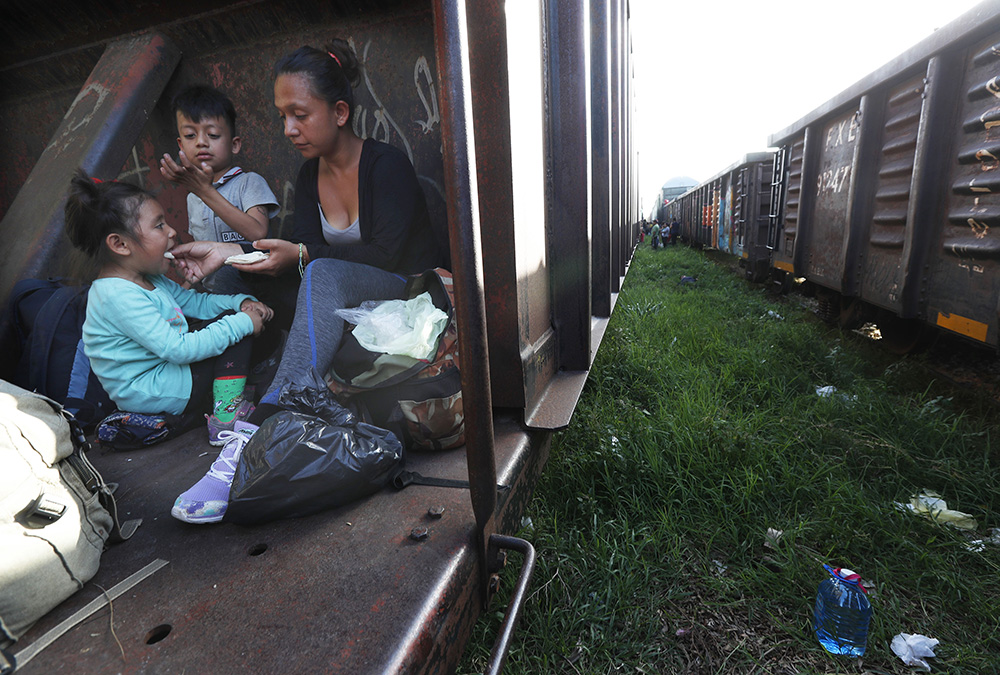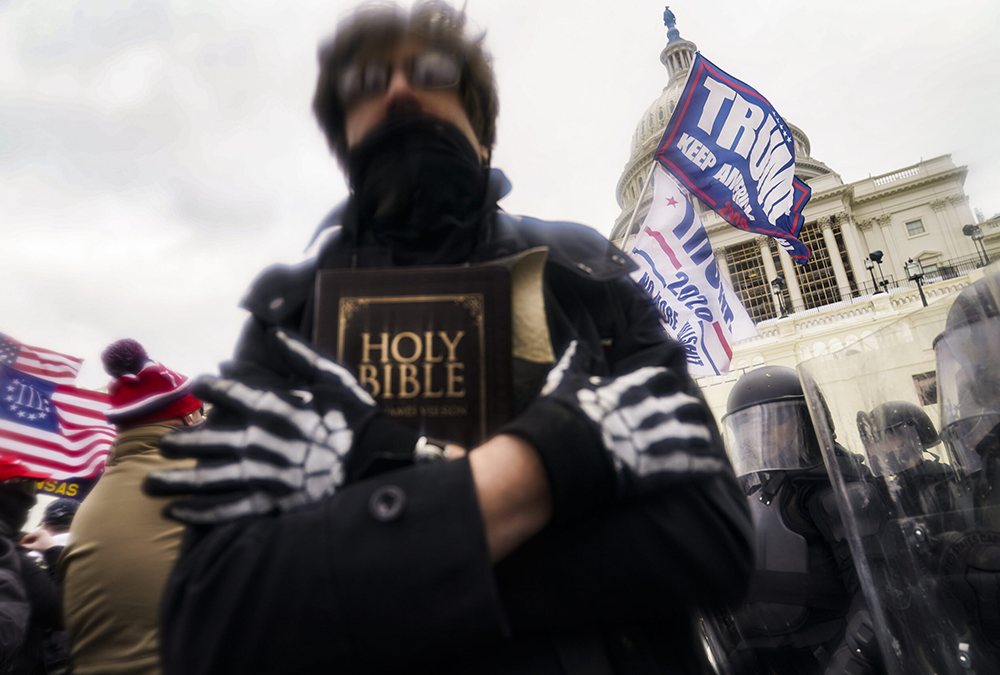
A migrant mother and children ride a freight train on their journey north, on June 24, 2019, in Palenque, Chiapas state, Mexico. Mexico deployed 6,500 National Guard members in the southern part of the country, plus another 15,000 soldiers along its northern border in a bid to reduce the number of migrants traveling through its territory to reach the U.S. (RNS/AP photo/Marco Ugarte)
When I was young boy in the 1950s, cowboy movies were popular. It was easy to tell the good guys from the bad guys because, in the movies, the good guys wore white hats and rode white horses, and the bad guys wore black hats and rode dark horses.
Sadly, in real life, too many of us want to divide people into the good guys and the bad guys. The good guys are our friends and neighbors, the bad guys are anyone who is of a different nationality, creed, color or political party. The good guys are members of our church, the bad guys are not. Fellow believers go to heaven, everyone else goes to hell.
In the Hebrew Scriptures we find that the people of Israel also saw the world as divided into good guys and bad guys. The people of Israel were the good guys because they had a special covenant with God, and they often felt that this excluded everyone else from contact with God.
Some books of the Old Testament, like Ruth and Jonah, challenged that view. One of the authors of Isaiah, known by Scripture scholars as Trito-Isaiah, reminds the people of Israel that God calls all people. Trito-Isaiah has the Lord say, "I come to gather nations of every language; they shall come and see my glory."
This same theme is picked up in the Gospel of Luke where Jesus tells us that "people will come from the east and the west, the north and the south, and will take their places at the feast in the kingdom of heaven."
God's salvific will is universal; it extends to all people. Every person on earth is offered God's love and grace. To the extent that they respond, they will be enveloped in God's love. To the extent they say yes to God, they will be united with God. This can happen without baptism. It can even happen when a person leads a loving life without recognizing God's love in their life.
This is what the Catholic Church affirmed at the Second Vatican Council (1962-1965). Ecumenism is all about recognizing that God can speak to all people, even those outside the Catholic Church and even those outside of Christianity.
The Gospels ask us to look beyond the borders of our community, beyond the borders of our neighborhoods and beyond the borders of our nation. A Christian must see all people as brothers and sisters capable of hearing God's Spirit. We can learn to hear the Lord better by listening to and respecting one another. This is what ecumenical and interreligious dialogue is all about.

In this Jan. 6, 2021, file photo, a man holds a Bible as Trump supporters gather outside the Capitol in Washington. The Christian imagery and rhetoric on view during the Capitol insurrection are sparking renewed debate about the societal effects of melding Christian faith with an exclusionary breed of nationalism. (RNS/AP photo/John Minchillo)
Today, many Americans embrace Christian nationalism, arguing that the founders of our republic were Christians and they meant us to be a Christian nation. While it is historically true that most of our founding fathers were Christians, it is also true that they wanted a secular government, free of religion. They had seen how uniting politics and religion in Europe led to religious persecutions and wars. These wars and persecutions led many to flee Europe for America. The founders wanted a government that would treat people of all faiths equally.
For John Adams, that meant even allowing the Jesuits asylum.
"I do not like the reappearance of the Jesuits," he wrote to Thomas Jefferson in 1816. "Shall we not have regular swarms of them here, in as many disguises as only a king of the gypsies can assume, dressed as printers, publishers, writers and schoolmasters? If ever there was a body of men who merited damnation on earth and in Hell, it is this society of Loyola's. Nevertheless, we are compelled by our system of religious toleration to offer them an asylum."
Advertisement
Christian nationalism is also wrong theologically. True, as Christians we should love our country, but Jesus tells us that we must love everyone as our brothers and sisters, even those of other creeds. This includes our fellow citizens and those of other nations.
We cannot ignore the poverty, hunger and sickness that afflict people outside our country. We cannot ignore violations of human rights and the rights of workers that provide us with cheap goods from abroad. We cannot ignore global warming because we have air conditioning. We cannot ignore exploitation of the environment because it is not in our neighborhood.
As Christians we cannot turn our backs on refugees from Haiti, Africa, Mexico and Central America. All are our brothers and sisters.
We can love our country, while recognizing that we, like the people of Israel in the Old Testament, are a sinful people in need of God's forgiveness and grace. Loving our country is not incompatible with recognizing the sin of slavery, the genocide against Native peoples and our role in global warming.
As Christians we are called to confess our sins, do penance and amend our lives. A true Christian nationalism would be capable of confessing our sins and committing ourselves to do better.





